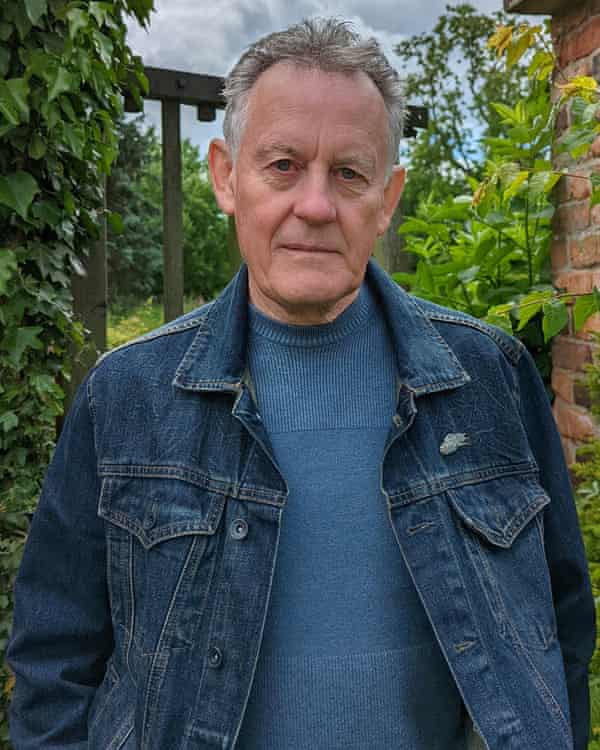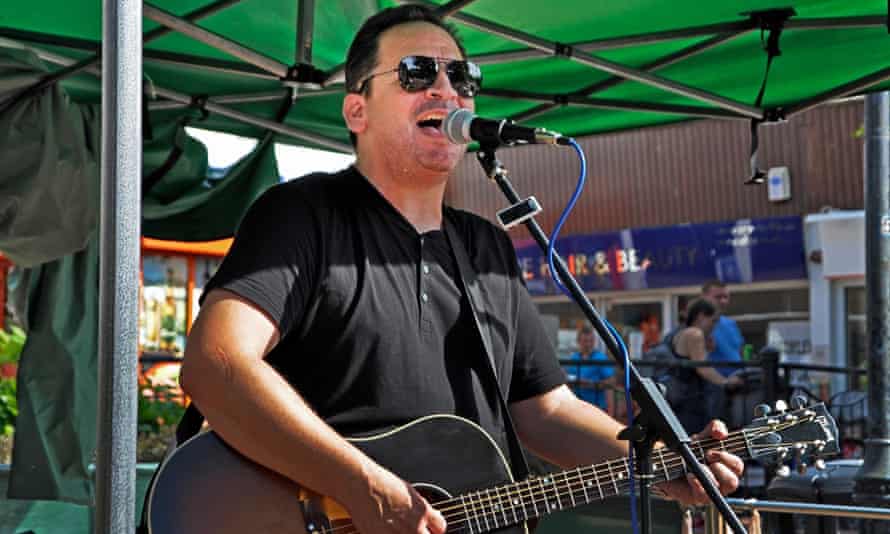‘I had to tape my fingers together to stop me tearing the skin’: the reality of living with Tourette syndrome

The singer Billie Eilish has spoken about living with the condition that affects 300,000 people in the UK. For many, trying to suppress their tics is exhausting. But others have learned to control their symptoms and use the energy as a driving force
Last month, the singer Billie Eilish talked candidly about her experience of living with Tourette syndrome. “I never don’t tic at all,” she told the talkshow host David Letterman. “The main tics that I do constantly, all day long, are: I wiggle my ear back and forth and raise my eyebrow and click my jaw.” She also flexes muscles in her arms, she says. “These are things you would never notice if you’re just having a conversation with me but, for me, they’re very exhausting.” The interview raised awareness of a condition that is still misunderstood – and helped to debunk some prevalent myths.
Although more than 300,000 people in the UK are known to have Tourette syndrome (TS), the real figure is likely to be much higher. But one common misconception is that the condition is characterised by loud, involuntary swearing – known as coprolalia. This only affects 10-20% of people with the condition; people with TS have a huge range of tics that can involve making sounds and movements, and often have co-occurring conditions, such as ADHD and obsessive compulsive disorder. So, how does it feel to live with this condition?

Ed Palmer, 30, is a doctor and lives in Birmingham
We used to call them “my habits” when I was little, because I don’t think anyone knew what they were. I would open my eyes really wide and say I was trying to get air into them. I was diagnosed at 14 – my mum had Googled it and thought that it could be Tourette syndrome.
There are periods when the tics got worse. In the run-up to exams, when I was stressed, I would stretch my fingers so much that I would end up tearing the skin between them. I would have to tape them together to stop me doing it. The eye tic would make my eyes red and I would get bad headaches. I’d bite my cheek and move my teeth and gums in a certain way causing my gums to bleed.
I felt that, for the most part, my tics were manageable – it was just during periods of stress that they were bad, so I was referred to a doctor to help me cope with the anxiety, more than the tics themselves. I remember saying to the specialist that if there was a tablet that would permanently take away my tics, I wouldn’t take it. It’s part of who I am.
I actively suppress them if I’m having an interview, or seeing a patient and I am conscious that it is distracting for them, or if I’m doing something practical where I need to keep still. I’m training to be a psychiatrist, but when I was working in hospitals, a surgeon once asked if I was safe to operate. Coming from a medic, it was slightly ignorant and the way that it was phrased was quite accusatory. I said, in no uncertain terms, that it wasn’t a problem.
My most common tic is I move and stretch my neck, so I’ll get someone ask: “Have you done something to your neck?” Then I decide whether to give them the long explanation, or just go: “Oh yes, I’ve pulled a muscle.”
As a doctor, I think it gives me an insight into what it’s like to have a diagnosis or a chronic health condition. I was never clinically interested in Tourette syndrome, but having done the clinic at a children’s hospital, I loved it. When a child is diagnosed, a thousand things go through a parent’s head. I think it was reassuring for them to see a doctor who had the same condition as their child.
Laura Allan, 20, is a student and lives in Glasgow
At school, I would get kicked out of class for eye-rolling and sighing, because the teacher thought I was being rude, but I didn’t know I was doing it. I would hum a lot, the most inane, humming noise. We didn’t know they were tics, it was brushed off as me just being an anxious child.

When I was 14, I started developing these shrieking, hiccup noises. It was happening several times a day, mostly when I was stressed. For someone who didn’t like attention, it made me incredibly anxious – I was having panic attacks and didn’t want to be in school. I had heard of Tourette syndrome but I thought it was just a thing that made people swear.
When I was 17, it got even worse, with physical and vocal tics – random words would come out, and I started hitting myself. It was so bad I stopped going to my classes. Then the pandemic hit, and I tried to study at home, but it’s difficult to read and take information in when you’re constantly moving – I ended up with no qualifications.
I’m now studying childcare and I’ve been working on a placement in a nursery. I’ve noticed that my tics go away when I’m around children, maybe because I’m so focused and relaxed, it’s the most amazing thing. Music also helps – if I’m listening to music, I tic a lot less and sometimes I don’t tic at all.
My college class doesn’t know the true extent of it, because, while I have told some of them, I always suppress it, so they haven’t heard most of my vocal tics. It’s exhausting. When I get home, the tics all come out. I struggle to be able to talk because a vocal tic will come out, and then another one, and then I’ll end up hitting myself. There have been at least three occasions when I’ve knocked myself out because I’ve punched myself that hard in the head.
The vocal tics scare me because I could catcall someone, I could get arrested. My neurologist told me to make sure I’ve always got something on me saying I have Tourette syndrome, in case a police officer pulls me over. I don’t tend to go out. I isolate myself in case something offensive comes out vocally. My neurologist is trying out different medications in the hope that something works, but he said my case is one of the worst he’s ever seen.
Society jokes about Tourette syndrome being a swearing condition but it is so much more than that. I’m not in control of whether I get hurt or bruised. My thoughts, speech and actions are out of my control and it’s exhausting, my brain is constantly active. It causes people a lot of physical pain, and a lot of emotional pain, too. You just have to take every day as it comes.
READ RELATED: Use private clinics to tackle cancer backlog, Sajid Javid told
Genna Barnett, 31, is a senior programme manager for a charity and lives in London

I was diagnosed when I was seven. I remember child psychologists asking me to draw how I felt. I drew myself with a bubble inside my stomach expanding; the only way to burst it was to do a tic – it’s quite a good description for how it still feels.
I used to make loud noises, like hiccupping. I would tap my fingers on my cheeks and jerk my shoulders and arms. I have this tic, where I tense my stomach muscles. When I was younger, I worried it would make me urinate, so I would go to the toilet excessively, like 20 times a day.
From the age of seven to 25, I was extremely ashamed and embarrassed. I tried to hide it, and never spoke about it. I had a close group of friends that were cool with it but I did have random people coming up to me in the corridors, which wasn’t great. It really affected my confidence and I had very low self-esteem.
I still make noises but they’re much quieter. People will say: “What is that?” or make fun of it, then I have to explain it, but most of the time my tics are quite subtle. People just think I’m doing weird stuff with my eyes or I have a cough. I don’t think they would know unless I told them.
It’s only in the last three years that I’ve become proud of it, and I’m now a trustee for the organisation Tourettes Action. Neurodiversity has almost become cool, so that wider context helped me and I became more secure and confident in who I was. I never thought too much about how embarrassed and ashamed I felt, then I started questioning it. I would hate for my children, and other young people today, to feel like that.
David Masters, 71, is a retired lecturer and lives in Bury St Edmunds

Even if you find ways of coping, the effort of suppressing tics can be as wearing as ticcing itself. One of the things that people with TS frequently say is that if they can find an activity that focuses them sufficiently, their tics go away. I found that art was something I could get utterly absorbed in, and I went to art college. Then I became a teacher and a lecturer; at times, I would tic, but on the whole my tics would go because I was so enthusiastic and absorbed.
I wasn’t diagnosed until my 40s. I went to a neurologist because I was having strange muscle spasms in my arm, and he said: “There’s nothing seriously wrong, but do you know you have Tourette syndrome?” I said, almost instantly: “You’ve just explained why my life has been the way it has.” It gave me a new confidence.
The tics I have include noises – coughs and squeaks – but mostly physical tics, which involve shrugging shoulders, turning the head and blinking the eyes to the point where it becomes painful. I now realise my mother had TS, but more severely than me. When I was diagnosed, I had to decide, as she was getting quite old at that point, whether I would tell her, and I chose not to – I think she would have felt guilty that she had passed on something to me.
In most cases, there are co-occurring conditions. I’ve had anxiety and bouts of depression. Tense situations, lack of sleep and anxiety are all the ingredients that will bring on some fairly severe tics. You learn to watch yourself and see things coming. For decades, I thought I must in some way be an inadequate human being. I’m grateful that the opportunity arose for someone to tell me what it was; everything fitted in to place.
Paul Stanworth, 50, is a musician and lives in Sussex

In my mid-20s, I was working for the police doing an office job. For the first nine months, I was the star of the department. Tourette syndrome gives you an enormous amount of energy and if you can channel that energy, you can put it to good use. But, after a while my tics started getting worse and, because I was sitting at a desk and was forced to be quiet all day, I had no release for them. I would go to the top of the stairs and have this massive outburst of tics, almost like a spasm, but I still didn’t know what it was.
The GP referred me to a psychotherapist, and when he said: “I think you’ve got Tourette syndrome and possibly OCD,” it was a relief. I cried because I was happy that they had found out what it was.
I have breathing rituals, where I have to breathe in when I look at certain things and breathe out when I look at other things, and also when I hear certain words. Usually, you breathe in for something you like and out for something you don’t, clean or dirty, good or bad. I’ve needed surgery as a result of some of my tics. There’s a tic in my arm, which meant I ended up having surgery for tennis elbow; and I had this habit of cracking my nose by jerking it to the side. After 10 years or so, I’d done some damage, so had to have surgery to repair it.
I’m still conditioned to suppress it, but I do tell people about it, too. If someone spots me and I’m doing a group of tics, where I’m jerking my head to one side, squeezing my face up or making a little noise, they don’t instantly think it’s Tourette syndrome, they might think I’m just a bit weird. Then, I feel I have to explain it, but I’d rather not. I wish there was more awareness.
I’m married with two kids. I’ve been very open with them about it, and they know there’s a chance they could develop some tics. I sat down with my wife before we had children, and we had that conversation. I was worried, but she said: “We’re in the best position to support them if they have, because we’ve got that understanding.”
I was medically retired from the police, and I knew I couldn’t sit still in an office ever again, so I had to work out another way to make a living; I always played music as a hobby, and now it’s my full-time job. Music was always my medicine, and a lot of people with Tourette syndrome say performing arts can be a good way of managing it. I love what I do. Those with Tourette syndrome have wonderful talents, driven by this unique energy. It drives me – I’m more passionate than I’ve ever been, and I don’t think I would be like that without the energy that I get from it.
Source: Health & wellbeing | The Guardian








